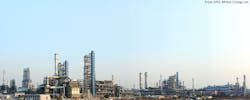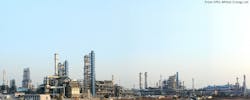HMEL lets contract for Bathinda refinery
HPCL-Mittal Energy Ltd. (HMEL), a joint venture of state-owned Hindustan Petroleum Corp. Ltd. and privately held Mittal Energy Investment Pte. Ltd., Singapore, has let a contract to Haldor Topsoe AS, Kongens Lyngby, Denmark, for a project designed to expand production of Bharat Stage (BS) 6-grade fuels (equivalent to Euro 6-quality fuels) at HMEL’s 9 million-tonne/year Guru Gobind Singh refinery at Village Phullokhari, about 35 km from Bathinda in India’s northern state of Punjab.
As part of the contract package awarded by Engineers India Ltd.—which is providing engineering, procurement, and construction management on the BS 6 fuel-quality project—Haldor Topsoe will deliver technology licensing and equipment for a diesel hydrotreating unit (DHU) as well as a revamp of the refinery’s existing hydrogen generation unit (HGU), Topsoe said.
For the DHU, Topsoe’s scope of delivery includes process technology, the reactor, accompanying internals, and its proprietary HyBRIM TK-611 ultralow-sulfur diesel catalyst to help improve nitrogen and sulfur-removal activity by 25% and enable longer cycle lengths during processing of complex feeds.
For the HGU revamp, Topsoe will provide two of its proprietary heat-exchange reformers, one for each of the unit’s two trains.
The DHU will have a nameplate capacity of 1.9 million tpy, while the HGU revamp will generate an additional 22,000 tpy of hydrogen, according to documents from India’s Ministry of Environment, Forest & Climate Change (EFCC).
Following its completion and startup in fourth-quarter 2019, HMEL’s BS 6 fuels project will equip the Guru Gobind Singh refinery to meet the government of India’s nationwide compliance deadline for 100% production of BS 6-quality fuels (maximum sulfur content, 10 ppmw) of Apr. 1, 2020 (OGJ, May 1, 2017, p. 64; OGJ Online, Apr. 4, 2017).
Topsoe did not disclose a value of the 36-month contract.
Refinery expansion, upgrades
The 11 billion-rupee upgrading project to meet BS 6-quality fuel specifications at HMEL’s Guru Gobind Singh refinery comes alongside and as part of the public-private partnership’s broader plans to expand the manufacturing site’s crude processing capacity to 11.25 million tpy from its current 9 million-tpy capacity, HMEL and EIL said in filings to EFCC.
Approved for environmental clearance by EFCC in June 2015, the capacity expansion, now under way, includes a combination of new units as well as debottlenecking work at existing units to improve throughput rates, HMEL said.
Neither HMEL nor EIL officially have confirmed a firm timeline or total estimated cost of the overall capacity expansion project.
Contact Robert Brelsford at [email protected].

